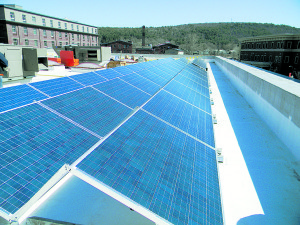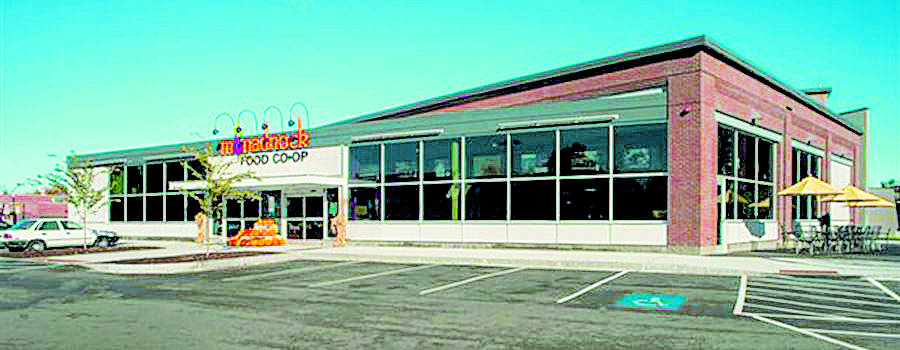
106 Ten K Solar 410-watt panels providing a capacity of 43.46 kW power the Monadnock Food Co-op community in Keene, NH. Photo courtesy of Craig Bell, Solar Source.
By George Harvey
A new solar system is being installed on the roof of the Monadnock Food Co-op in Keene, New Hampshire, by Solar Source (a division of the Melanson Company, Inc.). Craig Bell, the company’s general manager, provided us with specifications. The system was designed to make the best use of the co-op’s roof, fully occupying it. It consists of 106 Ten K Solar 410-watt panels, providing a capacity of 43.46 kilowatts (kW) DC. There are four Ten K 7.2-kW AC inverter buses, and a single Ten K 3.6-kW inverter bus. The estimated annual production is about 50,000 kilowatt hours. Eight of the panels are on the lower roof over the main entrance and can be seen from the parking lot, with the remainder of the panels on the upper roof hidden by the parapet.
Many people will find the history of this system most interesting. It was first envisioned in 2013, when the Monadnock Sustainability Network (MSN) and a group of Antioch University New England (AUNE) students conducted a study on community solar. Renewable power production and reducing carbon emissions were important goals, but the organizations also prioritized ownership by area people because local ownership promotes local sustainability.
The study led to a community presentation from which a steering committee was formed. It pointed the project in the direction of community supported solar (CSS). This is a type of community solar that is partly based on the model of community supported agriculture. The Monadnock Food Co-op was a natural fit for them, and its members were excited about having a solar system.
Community solar projects have been built in other places, so we might expect a clear path to follow. It becomes a problem, however, when state laws addressing the particular needs of CSS do not exist, and such was the case in New Hampshire. The federal rules are not supportive of broad participation, so MSN and the steering committee had to find their way through what turned out to be largely uncharted legal territory.
Fortunately, the legal work was largely done pro bono, but this did not make the job easy. The list of things that were not allowed under the laws seemed to be a lot longer than the list of available options. The work of finding the right combination was frustrating, and the process dragged on for the better part of two years.

Front of Monadnock Food Co-op with one row of panels installed. Photo courtesy of Monadnock Food Co-op
In the end, of course, the array is getting built and soon to be connected. The owners of this community solar project, all local individuals, will make a profit, though by no means a huge one. The Monadnock Food Co-op will get electricity from the sun at low cost, and in the not too distant future will be able to own the array.
In the process, MSN has gained a fully documented body of experience. They want to share this so others can do similar work in other parts of New Hampshire without the problems they had to endure. John Kondos, president of the organization, said, “We want to make it as easy as possible given the painful process we had to go through.” And so their documented guide can be had by others at very little cost.
The New Hampshire Community Supported Solar (NHCSS) Guide is available to all MSN members. Membership is available for $25 for those who are in the Monadnock region, and for $50 for others. MSN is providing a menu of support and legal documents explained in the guide, as well as consulting services. Since the need is clear, MSN has undertaken the work of changing the securities regulations at both the state and federal level to enable broad participation by local citizens in harvesting solar energy in their communities.
MSN’s website is www.greenmonadnock.org.








Leave a Reply